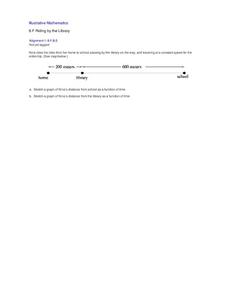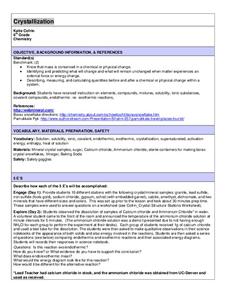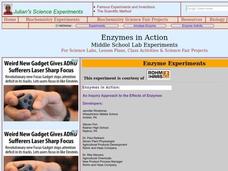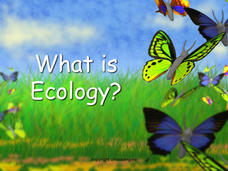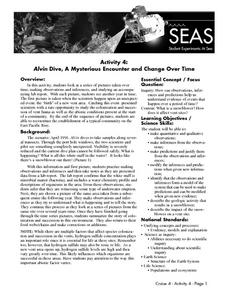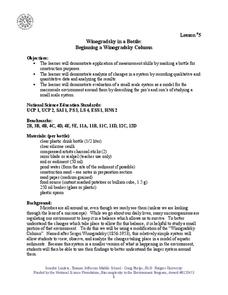Curated OER
Objects in the Sky
Students explore what the sky looks like at different times. They identify objects in the sky and recognize changes over time. Students observe the sky and look for objects that are common in both the daytime and the nighttime sky.
Curated OER
Population Models and Qualitative Analysis
In this quantitative analysis worksheet, students explore the limits of a rate equation. They use quantitative analysis methods to determine the differential, plot graphs of their values, and describe the relationships between the...
Illustrative Mathematics
Riding by the Library
Draw a graph that shows the qualitative features of a function that has been described verbally. Make sure learners understand where time is zero and the distance is zero. It may take them some time to understand this concept, so working...
Nuffield Foundation
Investigating the Effect of Concentration of Blackcurrant Squash on Osmosis in Chipped Potatoes
Model and explore osmosis using squash and potatoes. Young scientists expose chunks of potatoes to different concentrations of a squash solution. They compare the weights of the chunks before and after exposure to the solution and use...
Space Awareness
Oceans on the Rise
Temperature rises and land disappears! Through a lab exploration, learners understand the effect of temperature increase on water similar to the effect of global warming on our oceans. As they heat the water in a flask, they measure the...
Curated OER
Crystallization
Eighth graders analyze physical change in mass. For this chemistry lesson, 8th graders describe, measure and calculate the amount of physical change occurring in mass before and after the change. Students should be familiar with...
Curated OER
Cooler in the Shadows
Students explore how the amount of sunlight and heat change in areas that are shaded.
Curated OER
Sea Ice: Unscrambling the Egg Code
Students determine sea ice thickness, concentration, and floe size by reading egg codes. In this sea ice conditions lesson, students color code a map based on prescribed criteria and use the maps to identify changes in sea ice...
Curated OER
Thermodynamics Worksheet
In this thermodynamics instructional activity, students answer eight questions about reactions that involve change in entropy, they identify reactions as spontaneous or non-spontaneous and they solve problems using the laws of...
Curated OER
Enzymes in Action
Students explore how enzymes are important in the chemical reactions of all living things. In this enzymes and catalysts lesson students complete an activity to see how enzymes change living things.
Charleston School District
Increasing, Decreasing, Max, and Min
Roller coaster cars traveling along a graph create quite a story! The lesson analyzes both linear and non-linear graphs. Learners determine the intervals that a graph is increasing and/or decreasing and to locate maximum and/or...
Biology Junction
What Is Ecology?
Do you know the name for the biological study of interactions? A short presentation with accompanying worksheet introduces individuals to ecology. The materials offer a broad overview of the subject and the levels of organization to...
Curated OER
Heat Loss and Gain in Physical Changes and Chemical Reactions
Young scholars compare and contrast exothermic and endothermic reactions. In this chemistry lesson plan, students perform experiments to determine whether heat was released or absorbed in a reaction. They share their observations in class.
Curated OER
Activity 4: Alvin Dive, A Mysterious Encounter and Change Over Time
Students receive copies of the Time Series Observations to use for note-taking. They work in small groups to discuss what they see when the outside lights of Alvin are turned on, and off, where the bacteria may have come from. They view...
Curated OER
Water and Ice
Students observe, measure, and communicate while observing water convert from a solid to a liquid and back again. In this solid and liquid lesson plan, students answer questions as they observe this change.
Curated OER
Winogradsky in a Bottle: Beginning a Winogradsky Column
High schoolers use their measurement skills by marking a bottle for construction purposes. They record qualitative and quantitative data and analyze their results. Students demonstrate evaluation of a small scale systems as a model for...
Curated OER
Forest Friends Forever
Students investigate how to use the senses to gather information about objects such as size, shape, color, texture, sound, position, and change (qualitative observations are utilized throughout this lesson). They investigate and explain...
Curated OER
Water 1: Water and Ice
Pupils explore forms that water can take and examine the water cycle. In this hands-on science lesson plan, students participate in activities that require them to change water to a solid and back to a liquid again.
Curated OER
Water 1: Water and Ice
Students explore forms that water can take. In this science lesson, students participate in hands-on activities that require them to change water to a solid and back to a liquid again.
Curated OER
Water and Ice
Students explore water and ice. In this 3 states of matter lesson plan, students work with a partner to observe, illustrate, and describe the characteristics of an ice cube in a cup. The ice cube is observed again in 15 minutes and...
Curated OER
Poster Assignment: Sports Chemistry
Tenth graders distinguish between chemical and physical properties and changes in matter when given specific examples. They view a video of sports activities. Students chose their favorite sport and design an experiment to improve sports...
Curated OER
Winogradsky in a Bottle: Beginning a Winogradsky Column
Students study changes in the environment using a microscale experiment. In this environmental science lesson, students construct a modified "Winogradsky Column" to observe bacteria activities. They record observations and formulate a...
Curated OER
Using A Winogradsky Column to Analyze Microbial Communities
Students use easily obtained materials to study ecological succession in a microbiological community. This investigation is appropriate for a variety of age groups. Elementary Students be fascinated by the changes occurring over time...
Curated OER
Field Trip!: A Visit to the Grocery Store
Students discover that foods are organized into groups of similar items by developing vocabulary to enhance verbal discussion i.e., real experiences provide the foundation for thoughtful discussion and critical thinking. They then...
Other popular searches
- Math Qualitative Change
- Qualitative Change in Growth
- Interpret Qualitative Change
- Algebra Qualitative Change


